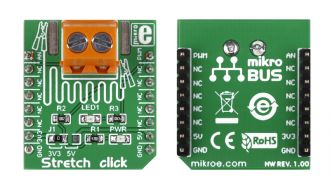
We strongly encourage users to use Package manager for sharing their code on Libstock website, because it boosts your efficiency and leaves the end user with no room for error. [more info]

Rating:
Author: MIKROE
Last Updated: 2019-03-14
Package Version: 1.0.0.1
mikroSDK Library: 1.0.0.0
Category: Force
Downloaded: 5782 times
Not followed.
License: MIT license
Stretch click is a mikroBUS add-on board with circuitry for measuring stretch forces with conductive rubber cords. The click has screw terminals for connecting 2mm-diameter and 1m-long conductive rubber cord. The resistance of the chord increases when stretched, impacting the voltage available on the AN pin.
Do you want to subscribe in order to receive notifications regarding "Stretch click" changes.
Do you want to unsubscribe in order to stop receiving notifications regarding "Stretch click" changes.
Do you want to report abuse regarding "Stretch click".

Library Description
The library covers all the necessary functions to control Stretch Click board. Stretch click communicates with the target board via analog ( AN ) pin. This library contains drivers for reading ADC value and turn on/off the LED.
Key functions:
Examples description
The application is composed of three sections:
void applicationTask()
{
valueADC = stretch_readADC();
Delay_100ms();
if ( valueADC < 500 )
stretch_turnOnLed();
else
stretch_turnOffLed();
IntToStr( valueADC, logText );
ltrim( logText );
mikrobus_logWrite( " ADC value: ", _LOG_TEXT );
mikrobus_logWrite( logText, _LOG_LINE );
mikrobus_logWrite( "-------------------", _LOG_LINE );
Delay_1sec();
}
Additional Functions :
Other mikroE Libraries used in the example:
ADCUART​ConversionAdditional notes and informations
Depending on the development board you are using, you may need USB UART click, USB UART 2 click or RS232 click to connect to your PC, for development systems with no UART to USB interface available on the board. The terminal available in all MikroElektronika compilers, or any other terminal application of your choice, can be used to read the message